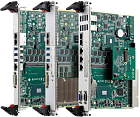 cPCI-6636(KL)
6U CompactPCI 6th/7th Gen Intel Xeon E3 and Core i3/i7 Processor Blade
The ADLINK cPCI-6636 Series is a 6U CompactPCI processor blade based on the 6th/7th Generation Intel Xeon E3 and Intel Core i3/i7 Processors with Intel HM170 or CM236 Chipsets. The cPCI-6636 supports up to 16GB onboard DDR4-2133 memory and 16GB DDR4-2133 via SODIMM. Total memory capacity is up to 32GB of DDR4-2133. The cPCI-6636 is a highly integrated processor blade fit for mission critical applications in industries ranging from automation to defence.
The cPCI-6636 is positioned as the successor to ADLINK’s cPCI-6626 and cPCI-6525 in terms of I/O and feature set. The cPCI-6636 provides a 2.8x performance boost over the 2nd gen Core i7 (cPCI-6626) and 30% performance boost over 3rd gen Core i7 (cPCI-6525). Graphics features include 3 symmetric independent displays, 3D HW acceleration, DirectX 12, OpenGL 4.4, and H.265 HW decode/encode. The cPCI-6636 achieves 2.7x graphics score improvement over the 3rd gen Core i7 (cPCI-6525).
The cPCI-6636 Series supports flexible I/O interfaces. Faceplate I/O for the cPCI-6636 (4HP) includes 2x GbE supported by an Intel i219LM PHY controller and Intel i210IT Ethernet controller, 3x USB 3.0, 1x RJ-45 serial port, and 1x DVI-I. Onboard I/O includes one 2.5″ SATA drive space, one 7-pin SATA connector, and one CFast slot by adapter board. The cPCI-6636D (8HP) has identical I/O to the single-slot version, except that an XMC connector via PCIe x8 adapter board is supported in place of the CFast slot. A third configuration, the cPCI-6636DZ (8HP), supports 8x USB 3.0, 2x GbE, 6x serial TX/RX and 2x VGA on the faceplate, and the same onboard I/O as the cPCI-6636D.
Rear I/O signals are available on cPCI-6636 and cPCI-6636D which are equipped with CompactPCI J3 and J5 connectors. Available to the RTM are up to 2x GbE to J3 by Intel I210IT Ethernet controllers for PICMG 2.16, and an additional 2x GbE switchable to rear from the front panel for a total of up to 4x Ethernet to rear J3 and J5. Also available are 1x VGA to J3, 1x TMDS to J5, 2x SATA 1.5 Gb/s to J3, 1x SATA 1.5 Gb/s to J5, 6x USB 2.0 to J3, 10x GPIO to J3 and J5, HDA and KB/MS to J3, and serial ports to J5. For PCIe expansion, the cPCI-6636 offers one PCIe x4 or 4x PCIe x1 to J5.
The ADLINK 8HP cPCI-6636DZ only supports operation in host slots, whereas the cPCI-6636(D) operate independently in both host and peripheral slots without CompactPCI bus communication (satellite mode), making it ideal for high density computing platforms. Moreover, the cPCI-6636 supports remote manageability by SEMA for system health monitoring over the Internet.
The cPCI-6636 Series offers outstanding computing power from the latest Intel processors and is an ideal solution for military, automation and other robust computing applications that require the highest computing power in a rugged, reliable CompactPCI system.
cPCI-6636(KL)
6U CompactPCI 6th/7th Gen Intel Xeon E3 and Core i3/i7 Processor Blade
The ADLINK cPCI-6636 Series is a 6U CompactPCI processor blade based on the 6th/7th Generation Intel Xeon E3 and Intel Core i3/i7 Processors with Intel HM170 or CM236 Chipsets. The cPCI-6636 supports up to 16GB onboard DDR4-2133 memory and 16GB DDR4-2133 via SODIMM. Total memory capacity is up to 32GB of DDR4-2133. The cPCI-6636 is a highly integrated processor blade fit for mission critical applications in industries ranging from automation to defence.
The cPCI-6636 is positioned as the successor to ADLINK’s cPCI-6626 and cPCI-6525 in terms of I/O and feature set. The cPCI-6636 provides a 2.8x performance boost over the 2nd gen Core i7 (cPCI-6626) and 30% performance boost over 3rd gen Core i7 (cPCI-6525). Graphics features include 3 symmetric independent displays, 3D HW acceleration, DirectX 12, OpenGL 4.4, and H.265 HW decode/encode. The cPCI-6636 achieves 2.7x graphics score improvement over the 3rd gen Core i7 (cPCI-6525).
The cPCI-6636 Series supports flexible I/O interfaces. Faceplate I/O for the cPCI-6636 (4HP) includes 2x GbE supported by an Intel i219LM PHY controller and Intel i210IT Ethernet controller, 3x USB 3.0, 1x RJ-45 serial port, and 1x DVI-I. Onboard I/O includes one 2.5″ SATA drive space, one 7-pin SATA connector, and one CFast slot by adapter board. The cPCI-6636D (8HP) has identical I/O to the single-slot version, except that an XMC connector via PCIe x8 adapter board is supported in place of the CFast slot. A third configuration, the cPCI-6636DZ (8HP), supports 8x USB 3.0, 2x GbE, 6x serial TX/RX and 2x VGA on the faceplate, and the same onboard I/O as the cPCI-6636D.
Rear I/O signals are available on cPCI-6636 and cPCI-6636D which are equipped with CompactPCI J3 and J5 connectors. Available to the RTM are up to 2x GbE to J3 by Intel I210IT Ethernet controllers for PICMG 2.16, and an additional 2x GbE switchable to rear from the front panel for a total of up to 4x Ethernet to rear J3 and J5. Also available are 1x VGA to J3, 1x TMDS to J5, 2x SATA 1.5 Gb/s to J3, 1x SATA 1.5 Gb/s to J5, 6x USB 2.0 to J3, 10x GPIO to J3 and J5, HDA and KB/MS to J3, and serial ports to J5. For PCIe expansion, the cPCI-6636 offers one PCIe x4 or 4x PCIe x1 to J5.
The ADLINK 8HP cPCI-6636DZ only supports operation in host slots, whereas the cPCI-6636(D) operate independently in both host and peripheral slots without CompactPCI bus communication (satellite mode), making it ideal for high density computing platforms. Moreover, the cPCI-6636 supports remote manageability by SEMA for system health monitoring over the Internet.
The cPCI-6636 Series offers outstanding computing power from the latest Intel processors and is an ideal solution for military, automation and other robust computing applications that require the highest computing power in a rugged, reliable CompactPCI system.
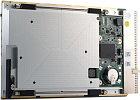 CT-3620
Rugged Conduction Cooled 3U CompactPCI Processor Blade with Quad-Core Intel Atom Processor
The ADLINK CT-3620 Series is a Rugged Conduction-Cooled 3U CompactPCI processor blade in single-slot (4HP) width form factor featuring a quad-core Intel Atom SoC and soldered DDR3L-1333 ECC memory up to 4GB. Graphics is integrated graphics on the CPU and storage is provided by an onboard 32GB SSD.
Rear IO signals include 2x GbE, 1x USB 2.0, VGA, 2x COM, and 1x SATA 3Gb/s, providing for expansion with an optional Rear Transition Module (RTM).
The CT-3620 is an ideal solution for transportation, military, factory automation and other industrial applications that require a rugged conduction-cooled solution with optimal computing performance and lower power consumption.
The ADLINK CT-3620 provides high manageability, supports Satellite mode operation as a standalone blade in peripheral slots, and features ADLINK’s Smart Embedded Management Agent (SEMA) for system health monitoring.
CT-3620
Rugged Conduction Cooled 3U CompactPCI Processor Blade with Quad-Core Intel Atom Processor
The ADLINK CT-3620 Series is a Rugged Conduction-Cooled 3U CompactPCI processor blade in single-slot (4HP) width form factor featuring a quad-core Intel Atom SoC and soldered DDR3L-1333 ECC memory up to 4GB. Graphics is integrated graphics on the CPU and storage is provided by an onboard 32GB SSD.
Rear IO signals include 2x GbE, 1x USB 2.0, VGA, 2x COM, and 1x SATA 3Gb/s, providing for expansion with an optional Rear Transition Module (RTM).
The CT-3620 is an ideal solution for transportation, military, factory automation and other industrial applications that require a rugged conduction-cooled solution with optimal computing performance and lower power consumption.
The ADLINK CT-3620 provides high manageability, supports Satellite mode operation as a standalone blade in peripheral slots, and features ADLINK’s Smart Embedded Management Agent (SEMA) for system health monitoring.
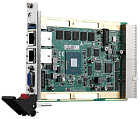 cPCI-3620
3U CompactPCI Intel Atom Processor Blade
The ADLINK cPCI-3620 Series is a 3U CompactPCI processor blade featuring a quad-core 4th generation Intel Atom SOC and soldered DDR3L-1333 ECC memory up to 4GB.
Available in single-slot (4HP) or dual-slot (8HP) width form factors, the cPCI-3620 Series utilizes various daughter boards to provide a broad range of I/O functionality. Front panel I/O on the single-slot (4HP) version includes 1x USB 3.0, 2x RJ-45 GbE and 1x VGA port (common to all versions). Front panel I/O on the dual-slot (8HP) version includes additional 2x USB 2.0, 1x COM, 1x PS/2 KB/MS and Line-in/Line-out on the cPCI-3620D or additional 2x GbE via MIL-STD M12 connectors and 1x COM on the cPCI-3620T. Another dual-slot option is the cPCI-3620S with an additional XMC site on layer 2. There is also a single-slot option that provides LED indicators only with no I/O on the front panel.
Graphics support is integrated on the SOC. Storage options include an onboard 32GB SSD (optional) and 2.5″ SATA drive on layer 2 riser card (cPCI-3620D/T). One optional PCI 32-bit/66 MHz PCIe x1 XMC site is available on the dual-slot cPCI-3620S version.
Rear I/O signals to J2 include 2x GbE, 1x VGA, 1x USB 2.0, 2x COM, 1x SATA 3 Gb/s, providing for expansion with an optional Rear Transition Module (RTM).
The cPCI-3620 is an ideal solution for transportation, military, factory automation and other industrial applications that require optimal computing performance for data transfer with lower power consumption. The ADLINK cPCI-3620 provides high manageability, supports Satellite mode operation as a standalone blade in peripheral slots, and features ADLINK’s Smart Embedded Management Agent (SEMA) for system health monitoring.
cPCI-3620
3U CompactPCI Intel Atom Processor Blade
The ADLINK cPCI-3620 Series is a 3U CompactPCI processor blade featuring a quad-core 4th generation Intel Atom SOC and soldered DDR3L-1333 ECC memory up to 4GB.
Available in single-slot (4HP) or dual-slot (8HP) width form factors, the cPCI-3620 Series utilizes various daughter boards to provide a broad range of I/O functionality. Front panel I/O on the single-slot (4HP) version includes 1x USB 3.0, 2x RJ-45 GbE and 1x VGA port (common to all versions). Front panel I/O on the dual-slot (8HP) version includes additional 2x USB 2.0, 1x COM, 1x PS/2 KB/MS and Line-in/Line-out on the cPCI-3620D or additional 2x GbE via MIL-STD M12 connectors and 1x COM on the cPCI-3620T. Another dual-slot option is the cPCI-3620S with an additional XMC site on layer 2. There is also a single-slot option that provides LED indicators only with no I/O on the front panel.
Graphics support is integrated on the SOC. Storage options include an onboard 32GB SSD (optional) and 2.5″ SATA drive on layer 2 riser card (cPCI-3620D/T). One optional PCI 32-bit/66 MHz PCIe x1 XMC site is available on the dual-slot cPCI-3620S version.
Rear I/O signals to J2 include 2x GbE, 1x VGA, 1x USB 2.0, 2x COM, 1x SATA 3 Gb/s, providing for expansion with an optional Rear Transition Module (RTM).
The cPCI-3620 is an ideal solution for transportation, military, factory automation and other industrial applications that require optimal computing performance for data transfer with lower power consumption. The ADLINK cPCI-3620 provides high manageability, supports Satellite mode operation as a standalone blade in peripheral slots, and features ADLINK’s Smart Embedded Management Agent (SEMA) for system health monitoring.
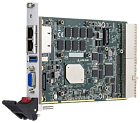 cPCI-3630
3U CompactPCI Intel Atom Processor X Series Blade
The ADLINK cPCI-3630 Series is a 3U CompactPCI 2.0 processor blade featuring the 64-bit Intel Atom Processor X Series SoC (formerly Apollo Lake I) and soldered DDR3L-1600 MHz ECC memory up to 8GB.
Available in single-slot (4HP) or dual-slot (8HP) width form factors, the cPCI-3630 Series utilizes various daughter boards to provide a broad range of I/O functionality. Faceplate I/O on the single-slot (4HP) version includes 1x USB 3.0, 2x RJ-45 GbE and 1x VGA port (common to all versions). Additional faceplate I/O on the dual-slot (8HP) versions include 2x USB 2.0, 1x COM, 1x PS/2 KB/MS and Line-in/Line-out on the cPCI-3630D; 2x DisplayPorts, 1x COM via RJ-45 connector, 1x KB/MS and USB 2.0 port on the cPCI-3630G; 2x GbE via MIL-STD M12 connectors and 1x COM on the cPCI-3630T; and 2x GbE in RJ-45 connectors and 1x COM on the cPCI-3630TR. Another dual-slot option is the cPCI-3630S with an additional XMC site on layer 2. There is also a cPCI-3630N single-slot option that provides LED indicators only with no I/O on the faceplate.
The Intel Atom SoC integrates the low-power 9th generation graphics engine and provide excellent graphics, media and display support. By using cPCI-3630G, it supports up to 4K HD resolution. Storage options include an onboard 32GB SSD (optional), mSATA socket or CFast and 2.5″ SATA drive space on the layer 2 riser card (cPCI-3630D/G/T/TR). One optional PCI 32-bit/66 MHz PCIe x1 XMC site is available on the dual-slot cPCI-3630S version.
Rear I/O signals to J2 include 2x GbE, 1x VGA, 1x USB 2.0, 2x COM, 1x SATA 3 Gb/s, providing for expansion with an optional Rear Transition Module (RTM).
The cPCI-3630 is an ideal solution for transportation, military, factory automation and other industrial applications that require optimal computing performance for data transfer with lower power consumption. The ADLINK cPCI-3630 provides high manageability, supports Satellite mode operation as a standalone blade in peripheral slots, and features ADLINK’s Smart Embedded Management Agent (SEMA) for system health monitoring.
cPCI-3630
3U CompactPCI Intel Atom Processor X Series Blade
The ADLINK cPCI-3630 Series is a 3U CompactPCI 2.0 processor blade featuring the 64-bit Intel Atom Processor X Series SoC (formerly Apollo Lake I) and soldered DDR3L-1600 MHz ECC memory up to 8GB.
Available in single-slot (4HP) or dual-slot (8HP) width form factors, the cPCI-3630 Series utilizes various daughter boards to provide a broad range of I/O functionality. Faceplate I/O on the single-slot (4HP) version includes 1x USB 3.0, 2x RJ-45 GbE and 1x VGA port (common to all versions). Additional faceplate I/O on the dual-slot (8HP) versions include 2x USB 2.0, 1x COM, 1x PS/2 KB/MS and Line-in/Line-out on the cPCI-3630D; 2x DisplayPorts, 1x COM via RJ-45 connector, 1x KB/MS and USB 2.0 port on the cPCI-3630G; 2x GbE via MIL-STD M12 connectors and 1x COM on the cPCI-3630T; and 2x GbE in RJ-45 connectors and 1x COM on the cPCI-3630TR. Another dual-slot option is the cPCI-3630S with an additional XMC site on layer 2. There is also a cPCI-3630N single-slot option that provides LED indicators only with no I/O on the faceplate.
The Intel Atom SoC integrates the low-power 9th generation graphics engine and provide excellent graphics, media and display support. By using cPCI-3630G, it supports up to 4K HD resolution. Storage options include an onboard 32GB SSD (optional), mSATA socket or CFast and 2.5″ SATA drive space on the layer 2 riser card (cPCI-3630D/G/T/TR). One optional PCI 32-bit/66 MHz PCIe x1 XMC site is available on the dual-slot cPCI-3630S version.
Rear I/O signals to J2 include 2x GbE, 1x VGA, 1x USB 2.0, 2x COM, 1x SATA 3 Gb/s, providing for expansion with an optional Rear Transition Module (RTM).
The cPCI-3630 is an ideal solution for transportation, military, factory automation and other industrial applications that require optimal computing performance for data transfer with lower power consumption. The ADLINK cPCI-3630 provides high manageability, supports Satellite mode operation as a standalone blade in peripheral slots, and features ADLINK’s Smart Embedded Management Agent (SEMA) for system health monitoring.
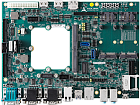 LEC-BASE-MINI
2nd Generation SMARC Reference Carrier Board
The ADLINK LEC-BASE MINI is the host carrier board for ADLINK’s SMARC modules and serves as reference design for SMARC modules. The SMARC module plugs directly into the LEC-BASE MINI where the carrier board becomes a design platform for testing and developing your applications.
LEC-BASE-MINI
2nd Generation SMARC Reference Carrier Board
The ADLINK LEC-BASE MINI is the host carrier board for ADLINK’s SMARC modules and serves as reference design for SMARC modules. The SMARC module plugs directly into the LEC-BASE MINI where the carrier board becomes a design platform for testing and developing your applications.
 LEC-BASE 2.0
SMARC evaluation carrier board for SMARC 2.0 compliant modules
The ADLINK LEC-BASE 2.0 is a host carrier board for ADLINK’s SMARC modules and serves as reference design for SMARC modules conforming to the SMARC 2.0 specification. The SMARC module plugs directly into the LEC-BASE 2.0 where the carrier board becomes a design platform for testing and developing your applications.
LEC-BASE 2.0
SMARC evaluation carrier board for SMARC 2.0 compliant modules
The ADLINK LEC-BASE 2.0 is a host carrier board for ADLINK’s SMARC modules and serves as reference design for SMARC modules conforming to the SMARC 2.0 specification. The SMARC module plugs directly into the LEC-BASE 2.0 where the carrier board becomes a design platform for testing and developing your applications.
 LEC-AL
SMARC Short Size Module with Intel Atom E3900 Series, Pentium N4200 or Celeron N3350 Processor
The LEC-AL Computer-On-Module (COM) combines the SMARC 2.0 standard with the latest Intel Atom E-Series and Pentium and Celeron N-series System-on-Chips (SoCs), providing ideal solutions for low power consumption and high performance requirements. The module provides the high integration, high performance, low power, and ruggedness favored by Internet- of-Things (IoT) applications such as retail transactional clients, digital signage, and in-vehicle infotainment systems. The LEC-AL module utilizes the latest Intel E-series and N-series SoCs, which are based on the Intel 64 Architecture, the new HD Graphics 500/505 engine, and a faster, 4-vector image processing unit. The SoCs are manufactured on Intel’s industry-leading, tri-gate 14nm process, improving system performance by supporting more than 4 GB of both virtual and physical memory.
The module primarily targets embedded intelligent systems used in several vertical market segments such as healthcare, industrial controllers and real-time systems, retail systems, edge IOT gateways, in-vehicle infotainment systems, printers, thin clients, industrial and ruggedized tablets, and many others. The LEC-AL supports contemporary, high-bandwidth interfaces such as Ultra HD HDMI, dual-channel LVDS, PCI Express Gen2, Gigabit Ethernet, USB 2.0/3.0, SATA Gen3, enhanced MIPI CSI camera, and a state-of-the-art HD Audio interface.
The module generates its own LVDS (18/24bit), TMDS, and Display Port ++ video signals using eDP and DDI output from the SoC. Two SPI Flash chips implement a fail-safe BIOS, allowing the user to boot the module even if current BIOS settings have corrupted the system. Under the management of the BMC chip (Board Management Controller), the SEMA utility (Smart Embedded Management Agent) provides system control, security, and failure protection— counting, monitoring, and measuring hardware and software events, and using the SMBus to send corrective commands to the SoC.
LEC-AL
SMARC Short Size Module with Intel Atom E3900 Series, Pentium N4200 or Celeron N3350 Processor
The LEC-AL Computer-On-Module (COM) combines the SMARC 2.0 standard with the latest Intel Atom E-Series and Pentium and Celeron N-series System-on-Chips (SoCs), providing ideal solutions for low power consumption and high performance requirements. The module provides the high integration, high performance, low power, and ruggedness favored by Internet- of-Things (IoT) applications such as retail transactional clients, digital signage, and in-vehicle infotainment systems. The LEC-AL module utilizes the latest Intel E-series and N-series SoCs, which are based on the Intel 64 Architecture, the new HD Graphics 500/505 engine, and a faster, 4-vector image processing unit. The SoCs are manufactured on Intel’s industry-leading, tri-gate 14nm process, improving system performance by supporting more than 4 GB of both virtual and physical memory.
The module primarily targets embedded intelligent systems used in several vertical market segments such as healthcare, industrial controllers and real-time systems, retail systems, edge IOT gateways, in-vehicle infotainment systems, printers, thin clients, industrial and ruggedized tablets, and many others. The LEC-AL supports contemporary, high-bandwidth interfaces such as Ultra HD HDMI, dual-channel LVDS, PCI Express Gen2, Gigabit Ethernet, USB 2.0/3.0, SATA Gen3, enhanced MIPI CSI camera, and a state-of-the-art HD Audio interface.
The module generates its own LVDS (18/24bit), TMDS, and Display Port ++ video signals using eDP and DDI output from the SoC. Two SPI Flash chips implement a fail-safe BIOS, allowing the user to boot the module even if current BIOS settings have corrupted the system. Under the management of the BMC chip (Board Management Controller), the SEMA utility (Smart Embedded Management Agent) provides system control, security, and failure protection— counting, monitoring, and measuring hardware and software events, and using the SMBus to send corrective commands to the SoC.
 LEC-PX30
SMARC Short Size Module with Rockchip PX30 Quad-Core Arm Cortex A35
LEC-PX30 based on power-efficient quad-core Arm Cortex-A35 SoC is a low-power, low-cost, entry-level, small-sized SMARC rev 2.0 module. For applications, such as IoT controllers, IoT gateways, wearable and mobile industrial devices, basic HMI, sensor concentrators, requiring good computing performance at low power consumption (1.5W — 5W) and Linux Yocto capability, LEC-PX30 is an ideal solution.
LEC-PX30
SMARC Short Size Module with Rockchip PX30 Quad-Core Arm Cortex A35
LEC-PX30 based on power-efficient quad-core Arm Cortex-A35 SoC is a low-power, low-cost, entry-level, small-sized SMARC rev 2.0 module. For applications, such as IoT controllers, IoT gateways, wearable and mobile industrial devices, basic HMI, sensor concentrators, requiring good computing performance at low power consumption (1.5W — 5W) and Linux Yocto capability, LEC-PX30 is an ideal solution.
 LEC-IMX8M
SMARC Short Size Module with NXP i.MX 8M
The SMARC («Smart Mobility ARChitecture») is a versatile small form factor computer on Module definition targeting applications that require low power, low costs, and high performance.
The Modules will typically use ARM SOCs similar or the same as those used in many familiar devices such as tablet computers and smart phones.
Alternative low power SOCs and CPUs, such as tablet oriented X86 devices and other RISC CPUs may be used as well. The Module power envelope is typically under 6W.
LEC-IMX8M
SMARC Short Size Module with NXP i.MX 8M
The SMARC («Smart Mobility ARChitecture») is a versatile small form factor computer on Module definition targeting applications that require low power, low costs, and high performance.
The Modules will typically use ARM SOCs similar or the same as those used in many familiar devices such as tablet computers and smart phones.
Alternative low power SOCs and CPUs, such as tablet oriented X86 devices and other RISC CPUs may be used as well. The Module power envelope is typically under 6W.
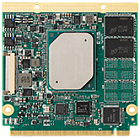 Q7-AL
Qseven Standard Size Module with Intel Atom E3900, Pentium N4200 and Celeron N3350 Processor
The Q7-AL Computer-On-Module (COM) combines the QSeven 2.1 standard with the Intel («Apollo Lake») Atom E-series and Pentium and Celeron N-series System-on-Chips (SoCs), providing ideal solutions for low power consumption and high pin/area density requirements. The module provides the high integration, high performance, low power, and ruggedness favored by Internet-of-Things (IoT) applications such as retail transactional clients, digital signage, and in-vehicle infotainment systems.
The QSeven form factor affords a more compact profile and footprint than the other COM platforms. With mechanical dimensions of 70mm width, 70mm length, and 2.3mm of overall height, Qseven ranks as one of the smallest COM standards currently available.
The Q7-AL utilizes the upgrades in Intel’s latest («Apollo Lake») N-series and E-series SoCs such as the Intel 64 Architecture («Goldmont»), the new HD graphics 500/505 engine (Gen-9), and a faster, 4-vector image processing unit. The SoCs are manufactured on Intel’s industry-leading, tri-gate 14nm process, improving system performance by supporting up to 8GB of system memory.
Compared to the previous generation («Braswell»), the Apollo Lake SoC comes with a larger package size (24×31mm2) and pin count (1296 pins) and has updated the OS support by adding Windows 10 IOT and removing support for Windows7/8.1 and WEC7/2013. Because Apollo Lake has more I/O interfaces than Braswell, no pin compatibility exists between these two generations of SoCs.
Q7-AL
Qseven Standard Size Module with Intel Atom E3900, Pentium N4200 and Celeron N3350 Processor
The Q7-AL Computer-On-Module (COM) combines the QSeven 2.1 standard with the Intel («Apollo Lake») Atom E-series and Pentium and Celeron N-series System-on-Chips (SoCs), providing ideal solutions for low power consumption and high pin/area density requirements. The module provides the high integration, high performance, low power, and ruggedness favored by Internet-of-Things (IoT) applications such as retail transactional clients, digital signage, and in-vehicle infotainment systems.
The QSeven form factor affords a more compact profile and footprint than the other COM platforms. With mechanical dimensions of 70mm width, 70mm length, and 2.3mm of overall height, Qseven ranks as one of the smallest COM standards currently available.
The Q7-AL utilizes the upgrades in Intel’s latest («Apollo Lake») N-series and E-series SoCs such as the Intel 64 Architecture («Goldmont»), the new HD graphics 500/505 engine (Gen-9), and a faster, 4-vector image processing unit. The SoCs are manufactured on Intel’s industry-leading, tri-gate 14nm process, improving system performance by supporting up to 8GB of system memory.
Compared to the previous generation («Braswell»), the Apollo Lake SoC comes with a larger package size (24×31mm2) and pin count (1296 pins) and has updated the OS support by adding Windows 10 IOT and removing support for Windows7/8.1 and WEC7/2013. Because Apollo Lake has more I/O interfaces than Braswell, no pin compatibility exists between these two generations of SoCs.
